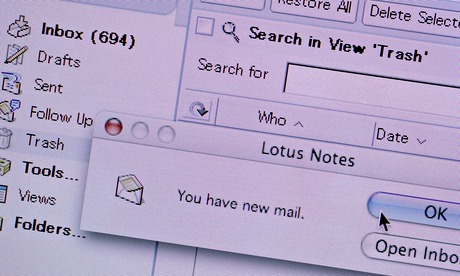Humans are too puny for email, bring on the spambots
Email isn’t broken. Our inability to handle all the data we generate and exchange marks us out as the weakest link
Few modern inventions have become so reviled so quickly as email. The American tech entrepreneur Shiva Ayyadurai told the Wall Street Journal: “When I tell people I invented email, the first thing they say is, ‘I want to kill you’.” It’s possible that, sometimes, the second thing they say is, “You didn’t actually invent email”. Ayyadurai created an early office email system in the late 1970s, but electronic mail had been around for years before that. In any case, our expert diagnoses the problem thus: “In the good old days the secretary did all the hard work and the boss did two things: dictating and editing. But email has made secretaries of us all. We spend up to 38% of our day managing email.”
This is perhaps a bit rude to secretaries; it also ignores the fact that everyone has always had to be his or her own secretary, except for the tiny minority of people who actually have secretaries.
But maybe the modern email deluge has created a situation where ordinary people for the first time feel as though they need secretaries to handle the deluge. Personally, if I had a stylishly mustachioed batman I would happily delegate to him the task of spending all day, every day, doing nothing but unsubscribing to email “alerts” that, with a sardonic psychic violence, always send you one final piece of spam to alert you that you have successfully opted out of their useless alerts.
The story of email, sadly, is yet another example of why we can’t have nice things. As one of the dwindling band of freakish oldsters who grew up without the internet, I remember how email back in the 1990s seemed a wonder of civilised modernity. No need to rudely interrupt someone and demand she drop whatever she is doing in order to speak on the telephone. Email is free, fast, reliable and “asynchronous”, which means communication doesn’t have to happen in real time. People can choose their moment to reply.
Unfortunately, that moment is, increasingly, never. Email is now held up as the major culprit of “information overload”; it’s in crisis: beard-stroking tech commentators declare that it is “broken”.
“Managing” email has become a whole micro industry unto itself, in a world where we are obliged to become not only our own secretaries but “managers” of obstreperous datasets. An entire self-help genre is devoted to achieving the digital nirvana of “inbox zero”. Gmail keeps experimenting with tabs and other devices to separate your inbox into “inbox”, “priority inbox”, “inbox of possibly actually quite important emails”, and “oh go on, one more inbox for fun”, though it is not clear this makes any more sense than drilling seven different letterboxes into your front door.
A sceptic might suggest that at least some people don’t actually want email to be fixed in any such way, because the exciting modern phenomenon of boasting on Twitter with ironic sad-facedness about how many unread emails are in your inbox – attaching, for proof, screenshots of a boldfaced five-figure number – is just another social media performance of status, a way of saying, “OMG, look how important and in-demand I am!”
As we all know, however, technology itself usually solves technological problems (which is why global warming will be stopped by a combination of Uber and MOOCs), and Ayyadurai’s own suggestion is that, in the future, intelligent automated systems will sift our emails for us and suggest appropriate replies. (Naturally, he is promoting his own system for so doing.)
The only problem with this is that it doesn’t go far enough in its techno-optimism. Imagine the labour that could have been saved if an AI algorithm had written this article and emailed it to my editor for me, and if other algorithms instantly set to work posting classic replies such as “tl;dr” or “Did the writer actually get paid for this rubbish?” in the comments below.
One real and unarguably positive way of helping people deal with email overload has been demonstrated by the recent French rules that protect workers from emails outside office hours.
But this probably bespeaks far too sentimental and Gallic a concern for quality of life to catch on in the “productivity” crazed Anglosphere. A similar result, however, might be achieved by pursuing algorithmic outsourcing to its logical endpoint. The real problem with electronic media, after all, is the puny capacity of humans to handle it. We are the weakest link. So I for one look forward to the day when we will have outsourced all interpersonal communication to advanced spambots, and are freed to stare lazily into space reminiscing fondly about the golden days of a smartphone vibration every minute.
Source: Theguadian



Comments